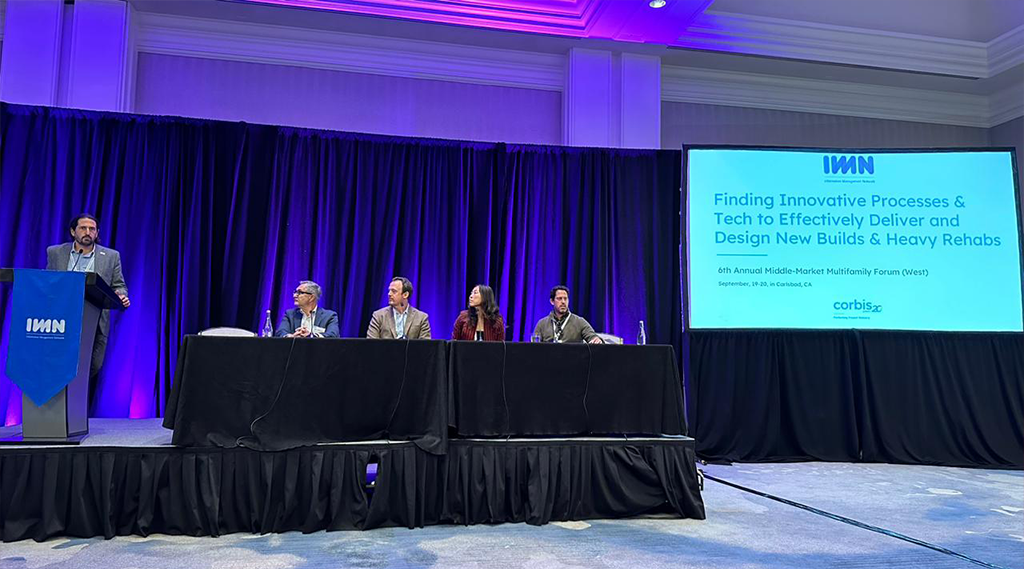4 ways tech elevates project delivery: IMN insights
September 22, 2023
Technology is a game-changer in design and construction, but widespread adoption lags. Our recent panel at the 6th Annual Middle-Market Multifamily Forum - IMN discussed the industry's current tech landscape and ways to leverage it for positive change.
To cover this hot topic, we gathered Lina Lee, Vice President of Development at CIM Group; Tyson Sayles, Principal at Ensemble Investments, LLC; Alexander Sandy Albert, Partner at CityPads; and Gio Aliano, AIA, Senior Vice President and Principal Architect at Abode Communities. The industry experts unanimously agreed that technology has a decidedly positive impact on design and construction. However, while the technological landscape is vast and ever-expanding, adoption remains scarce, and the industry requires a seasoned team to wield its tools properly.

According to panelists, the main contribution of AI, BIM, and other technologies is to help manage better. We can summarize their positive impact in the four Cs: Communication, Coordination, Change management, and Cost control. Let's take a look at them one by one:
Any successful project relies on effective communication. Technology facilitates seamless interactions among project stakeholders, ensuring everyone is on the same page and reducing the likelihood of misunderstandings.
Coordination within a project can be challenging, especially in large and complex undertakings. Technology streamlines coordination efforts, making managing resources, schedules, and tasks easier.
"Strategizing and setting up projects early using the right teams and technology is key"
Alexander Albert.
Change is inevitable in any project, and it can come from various sources, including alterations in design or regulations. Some variations, however, present opportunities to improve and adapt to market needs. Technology is critical to implementing these changes quickly and accurately.
"There are some opportunistic changes. When a project gets delayed by permitting or financing, it gives you the opportunity to change things to match your market needs and deliver a better product. If you can make it, then you have to make it."
Lina Lee.
Cost overruns can be detrimental to any project. Therefore, technology offers tools and insights that help project managers control costs more effectively, preventing budgetary deviations.
"The earlier the investment in technology, the higher the returns."
Tyson Sayles.
Seasoned project management: the best investment
When the experts had to value the most crucial team skill, they prioritized seasoned project management. This statement demonstrates that, while technology is a powerful tool, it must be used by capable hands. In the wrong hands, even the best technology can be useless. And as much as AI, BIM, and other technologies exist, the actual implementation is still to be seen. Early adopters will be ahead of the game when they find a way to maximize the leverage of tech in their design and construction process.
"Sometimes, there needs to be more clarity about the use of technology. Using software like Revit or Rhino is not necessarily easy because we have to tell the computer what to do to make it do it right. At the end of the day, the final product will be better because we know how to use technologies to make it better."
Gio Aliano
In a world where buildings are becoming increasingly complex and schedules more compressed, the effective use of technology is not just advantageous but inevitable. Ultimately, success involves assembling the right project and design teams, creating a collaborative environment, and prioritizing cooperation over ego. As highlighted by the panel, this formula will lead to the true co-creation and successful delivery of your building projects in the digital age.